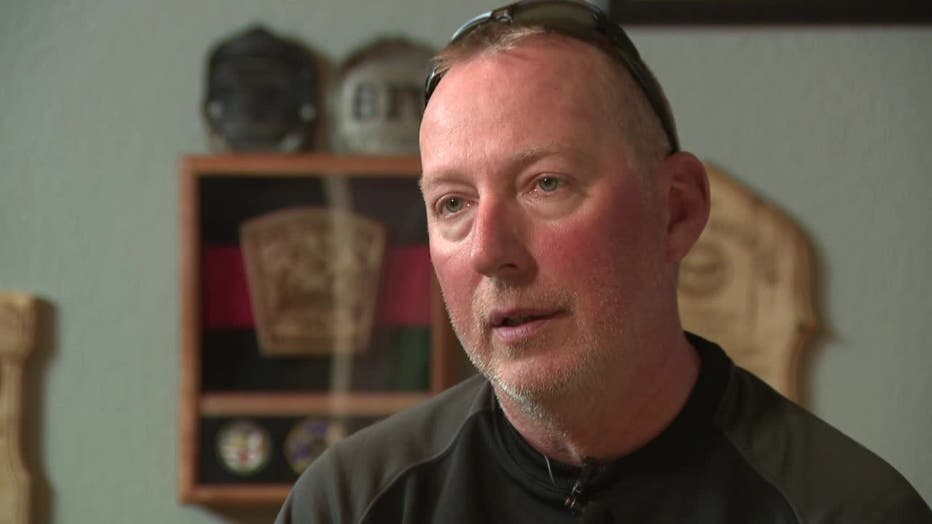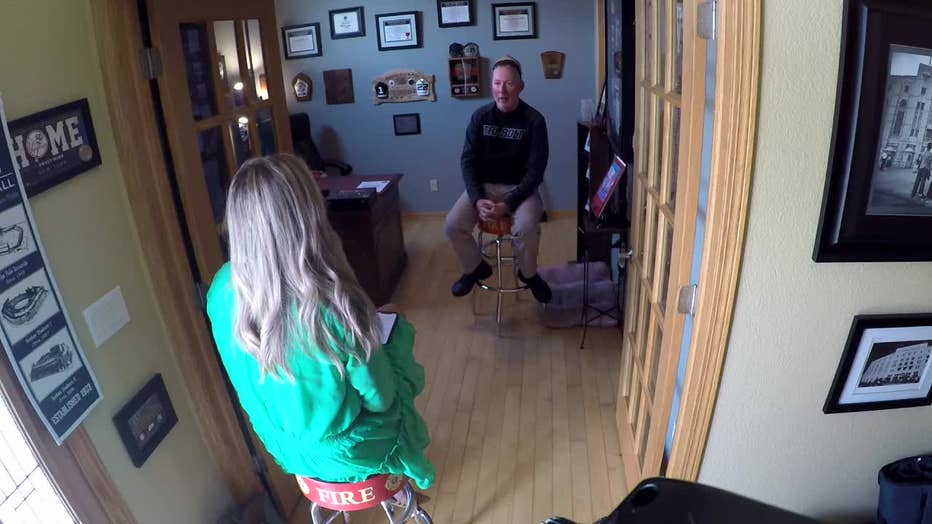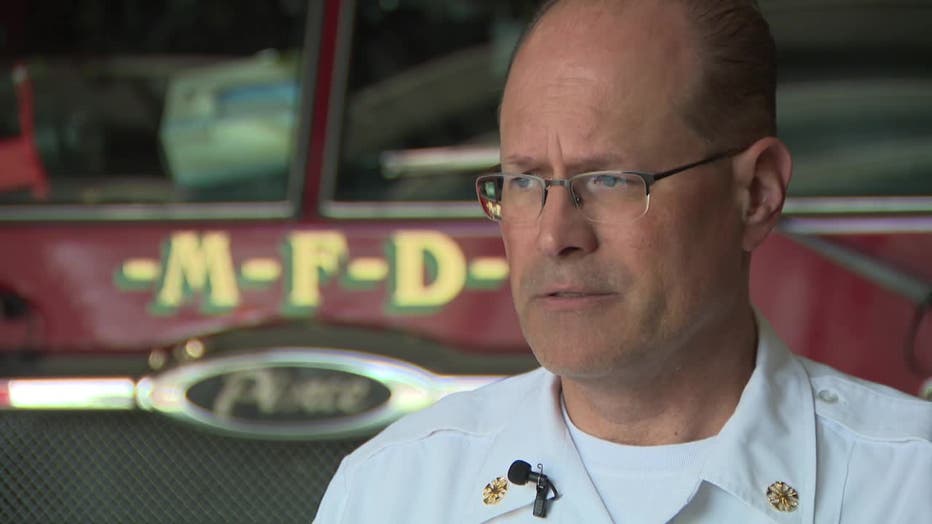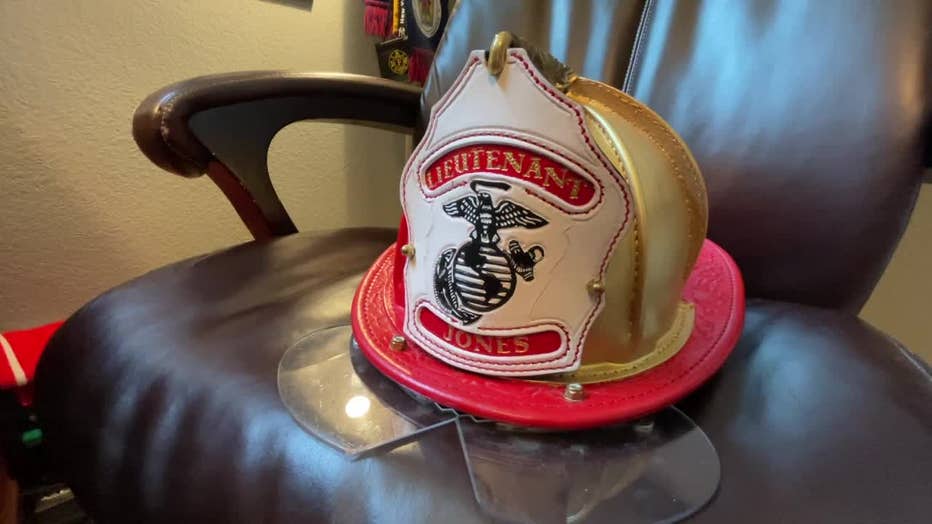Coping with trauma; Milwaukee firefighter now retired helps others

Burned Out: Firefighters and mental health
A retired Milwaukee firefighter is using his voice to speak up on secondary trauma he?s experienced on and off the job, after almost silencing his own voice.
MILWAUKEE - For 23 years, Lt. Brent Jones has grown accustomed to using his voice as a firefighter in Milwaukee and on honor guards across the country. He’s now using his voice to speak up on secondary trauma he’s experienced on and off the job, after almost silencing his own voice.
"I had my gun to my head three times, finger on the trigger ready to pull it," said Jones.
The now-retired Milwaukee firefighter is using his experience to help others better cope with the trauma they experience on and off the job.
"You can only see so much grief before it gets to you," said Jones.

Brent Jones
Jones has a long history of public service in his family beginning with his father who was a Wisconsin state trooper. When Jones became a firefighter in 2000, he joined the honor guard and over the years, has taught it alongside his dad, to firefighters across the country. Jones estimates he’s covered more than 500 line of duty deaths involving first responders.
"You learn to treat them how you want family to be treated if something happened to you," he said.
SIGN UP TODAY: Get daily headlines, breaking news emails from FOX6 News
In 2018, the stress hit a breaking point for Jones. He had been on the front lines of countless emergencies and violence as a firefighter. He coordinated line of duty services for first responders across the country including friends and colleagues, some of whom died by suicide. The violence, grief, and death became too much, when he nearly took his own life.

Brent Jones
"The only reason I didn’t was the amount of suicide funerals that I had helped with," said Jones. "Those family members need someone helping them more than anyone."
Jones credits a fellow firefighter who asked a simple question – that changed the trajectory of his life.
"He asked me how I was doing, I said fine," he recalled. "I let it slip that I had my gun to my head. That’s when he said, ‘you’re going to Maryland.’"
Jones spent 44 days at the IAFF Center of Excellence for Behavioral Health Treatment & Recovery. He was admitted for mental health reasons and substance abuse.

"That place saved my life and Trevor saved my life by making me go," he said.
That inpatient treatment option and peer-to-peer conversation are two ways the Milwaukee Fire Department is trying to help its own cope with the everyday trauma they experience on the job.
FREE DOWNLOAD: Get breaking news alerts in the FOX6 News app for iOS or Android
"We’re battling and coming to grips right now with burn out, compassion fatigue, a sense of apathy," said Milwaukee Fire Chief Aaron Lipski. "Easy to have those things develop when you go out the door and all you see is the worst over and over again."

Milwaukee Fire Chief Aaron Lipski
At MFD, the first tier involves peer support, then a clinician level option, followed by inpatient services like Jones received. EAP services are also available to those who choose to use them, according to Lipski.
Another resource offered to anyone in the state, is the Department of Health Service’s 988 suicide and crisis lifeline. A call, text, or chat option available to anyone including first responders like Jones, who are exposed to traumatic events, work long shifts and deal with a stigma surrounding asking for help.
"If you don’t take the time to deal with it right away, you’re going to be on the next call and the next call and the next call," said Jones. "And it’s going to compound."

In 2021, Jones took his passion to help others to the state level. He testified in favor of then Act 29; the now state law allows first responders diagnosed with PTSD from mental related injuries to qualify for workers compensation.
"Without this bill, you’re going to see suicides in the next twenty years double and triple within police and fire if we don’t get them the help they need," Jones testified in 2021. "Our members need help. I’m hoping you guys will help them sooner rather than later."
Jones retired in early 2023, but is still teaching honor guards across the country. Part of his curriculum involves "peer support" which he says made all the difference in his own story.

The Milwaukee Fire Department is also looking at the 24-hour shift model. Chief Lipski said they acknowledge sleep deprivation can have real physical effects for firefighters. Those conversations with the union are ongoing.

